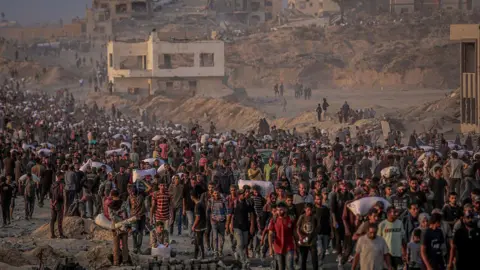The situation in Gaza has intensified dramatically, with the Israeli military presently engaged in a thorough investigation concerning reports of civilian casualties connected to aid distribution centers affiliated with the Gaza Humanitarian Foundation (GHF). This scrutiny arises amid troubling reports suggesting that hundreds have been killed during attempts to access critical aid, exacerbating further tensions in the ongoing conflict that has historically marred the region.
Since the inception of GHF operations in late May, following the lifting of a three-month blockade on Gaza, alarming reports have surfaced daily from various sources, including medical personnel, bystanders, and the Hamas-run health ministry. They detail incidents where Israeli fire has reportedly resulted in the deaths of individuals seeking humanitarian assistance. The United Nations has indicated that over 400 Palestinians have died while reaching out for aid, illuminating the dire humanitarian crisis unfolding in the region.
In response to these alarming conditions, the Israeli military stated on Monday that it has directed its forces to reassess and adapt their strategies based on insights gained from prior operations. However, the specifics of what lessons were learned from these incidents remain unclear. The Israeli Defense Forces (IDF) have frequently asserted that they have discharged what they describe as “warning shots” aimed at individuals they suspect of posing a threat while approaching military personnel.
Reporting from several Israeli media outlets, including the Times of Israel, has indicated that the IDF has acknowledged incidents where Palestinians were harmed while pursuing aid, yet the military questionably dismisses the casualty figures provided by Hamas as inaccurate. Notably, it has been revealed that certain cases involved what the IDF itself labeled as “inaccurate” fire, which consequently resulted in casualties and fatalities.
Engagements with the IDF over these troubling reports have affirmed that allegations of harmful incidents are being rigorously reviewed. The military has expressed its commitment to investigating any potential breaches of law or deviations from established directives to ensure accountability and appropriate response measures when necessary. Specific claims that Israeli troops were intentionally targeting unarmed civilians, particularly near aid distribution zones, were firmly denied by the IDF. Such claims gained traction following a report from the Israeli newspaper Haaretz, which alleged that unnamed IDF soldiers had been instructed to fire at unarmed civilians to force them away from these critical aid sites.
Israel’s Prime Minister, Benjamin Netanyahu, vehemently dismissed these allegations as malicious and unfounded, reaffirming the state’s position against any deliberate targeting of civilians. The GHF system has been criticized by United Nations agencies, with Secretary-General Antonio Guterres categorizing it as “inherently unsafe,” emphasizing that it was designed to circumvent traditional UN-led aid operations to prevent aid from being seized by Hamas—a claim the group vehemently denies.
The toll has been grim; within days of the GHF’s operations beginning, numerous civilians were reported killed due to separate incidents. GHF’s administrator, Johnnie Moore, while not denying reports of casualties, contested that attributing these deaths solely to proximity to the GHF’s aid operations is misleading.
Access restrictions have also been introduced, as the Israeli military announced plans to reorganize access protocols to aid sites, which will involve new fencing and proper signposting to enhance operational responses and mitigate friction with the local population. The military also indicated intentions to close an aid center in Tel al-Sultan, with plans for a new one to be established nearby.
In an international context, it was reported that the US State Department recently allocated $30 million to the GHF, reinforcing its support for this controversial aid framework. Amid such developments, Israel has partially eased its blockade following international pressure due to escalated warnings about starvation risks for nearly half a million people in Gaza. The military campaign initiated by Israel in response to a devastating Hamas assault on October 7, 2023, which claimed approximately 1,200 Israeli lives and abducted over 200 others, has led to catastrophic consequences, with Gaza’s health ministry reporting more than 56,500 fatalities since the onset of the conflict. The ongoing escalation highlights the urgent need for humanitarian access and accountability in an increasingly perilous environment.











